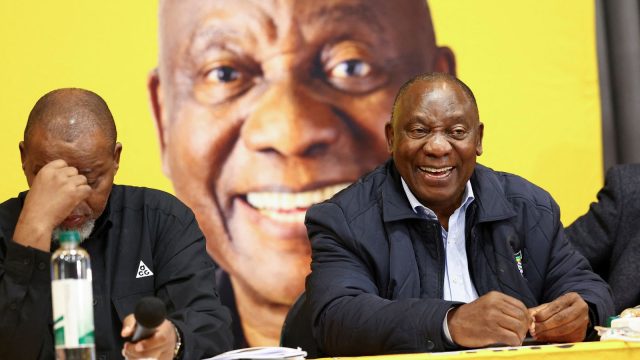South African President Cyril Ramaphosa has said his party will invite others to join a national unity government.
His African National Congress (ANC) lost its majority in last week’s election and for the first time since the end of apartheid cannot govern alone.
The party will have 159 of the 400 seats in the new National Assembly, meaning it needs others to help it pass laws.
Mr Ramaphosa made the unity announcement after a meeting of the ANC’s executive committee on Thursday.
He said it was important to act quickly to form a broad unity government that must take on issues that matter most to people, such as unemployment, crime and corruption.
Mr Ramaphosa, 71, said he has not ruled out working with any of the ANC’s rivals as long as it’s in the public interest.
He added constructive talks had already taken place with many of them.
Rivals include the Democratic Alliance (DA), with 87 seats, former president Jacob Zuma’s uMkhonto we Sizwe (MK), with 58, and the hard-left Economic Freedom Fighters (EFF) with 39.
MK said earlier on Thursday that discussions had already taken place with the ANC over a possible coalition.
Read more from Sky News:
Analysis identifies US-made bomb at Gaza school strike
Trump ally Bannon ordered to report to prison
However, the DA indicated on Wednesday it did not want to join a deal that included the MK or the EFF.
Ex-president Zuma also said after the election his party would not cooperate with “the ANC of Ramaphosa”, with the ANC in turn saying it wouldn’t enter discussions with anyone demanding Mr Ramaphosa step down.
The ANC, a former liberation movement, has governed South Africa since Nelson Mandela became leader in 1994.
But over the last decade its support has dwindled amid widespread poverty, a stagnating economy, rising unemployment, and power and water shortages.
The poverty disproportionately affects black people, who make up 80% of the population and have been the core of the ANC’s support for years.











![Fuse ODG violently handcuffed, dragged out of his car by UK Police over alleged ‘Wee’ smell [Video]](https://ghananewss.com/storage/2023/05/Fuse-ODG-hand-100x75.jpeg)








